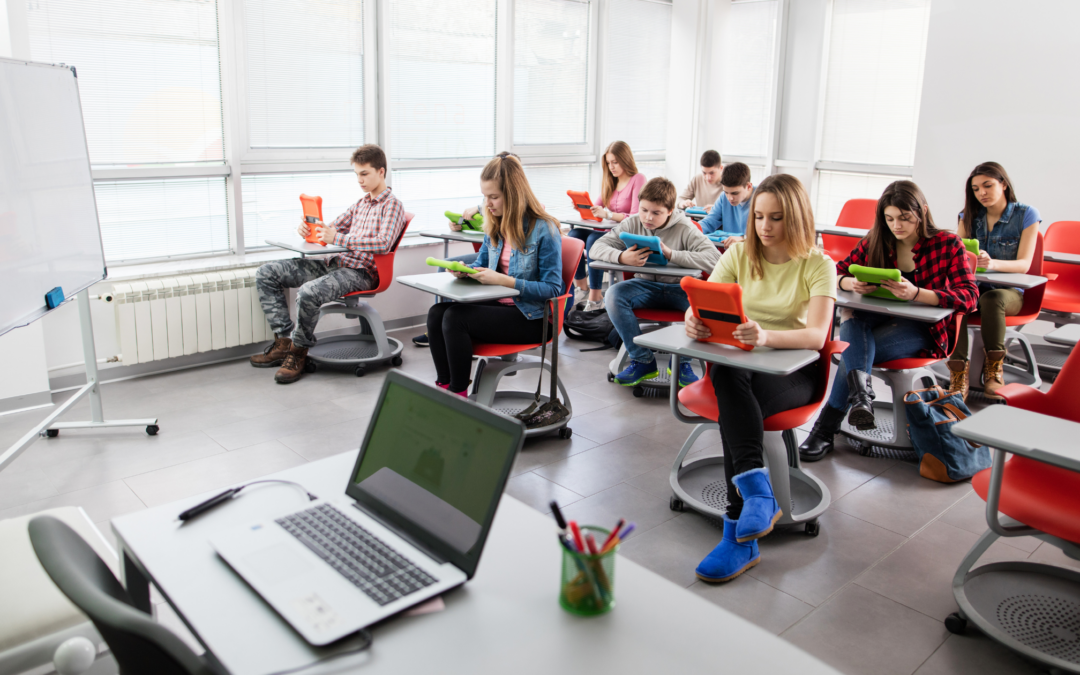Public School vs. Homeschool Socialization
Should public school socialization be considered the norm?
One of the most frequently cited concerns with homeschooling is socialization. People unfamiliar with homeschooling often express concern that homeschooled children will miss out on the opportunities for socialization provided by public schools. They worry that homeschooled children will grow up sheltered, socially stunted, and unable to integrate into society as adults.
Such critiques imply that “healthy socialization” equals “attending public school.” In this article, we will explore why equating healthy socialization with the public school experience is incorrect and why homeschoolers (or prospective homeschoolers) can feel confident about their decision to take on the role of primary educator fully.
What is Socialization?
To start, let’s review the concept of socialization. Socialization is the process by which people internalize the norms and ideologies of society through social engagement. It is a broad concept, essentially a catch-all term describing the multitude of ways people learn to get along with each other in society.
Given that it is such a vast concept, we should immediately be wary of associating it too closely with something as singular as the public school regimen. Similarly, we would be wary of someone who associates all music with a single genre or all literature with a single author. Public school can certainly be an aspect of socialization, but it is not the whole picture.
Furthermore, there are good reasons why we should not consider public school socialization to be normative. That is to say, the type of socialization in public school doesn’t reflect the types of social interactions children will experience when they graduate and enter the “real” world. There are several reasons for this…
Age Segregation
Socialization in public schools is age-segregated. Children generally spend their entire K-12 school experience interacting primarily with children their age. That’s not to say this isn’t real socialization or not valuable. Still, we should understand that it is a highly particularized type of socialization with no parallel in the outside world. There is no other environment or situation in everyday life where people are so rigidly segregated. We should, therefore, be careful of treating public school socialization as the norm when it is so unlike any other social environment.
Occurs in a Heavily Controlled Environment
Public school socialization also occurs within a heavily controlled environment. Children move throughout the day according to a fixed schedule. Behavior in the classroom is not spontaneous. It is governed by the teacher’s class guidelines regarding who can sit where, who can speak and when, what children should be doing, etc. Lunch happens at prescribed times, and even going to the bathroom requires permission.
In many modern schools, hall and cafeteria activity is monitored by security cameras. Again, these aspects of public school aren’t bad in themselves. They are logistical consequences of organizing a functional school day with hundreds of children. (See Phillip Campbell’s article, “This is Why Homeschooling Takes Less Time.”) The controlled nature of public schools hardly constitutes a “normal” social environment.
Socialization in such an atmosphere will develop in ways specific to the public school’s environment. This is why public schools tend to have their own internal “cultures.” Highly regimented institutions such as schools, the military, prisons, sports teams, etc., tend to become social sub-groups with their own particular social norms. This isn’t bad, but it’s not normative. Just as we would not expect the type of socialization learned in military barracks to translate perfectly into civilian life, so neither should we think of public school socialization as normative.
Not All Inclusive
Is going to school supposed to be all your child does in life? Of course not! Children have hobbies outside school. This can include family engagements, extracurricular activities, church, and social gatherings with friends. Public school children have lives outside of school. So, why do people act like public school is their sole chance to socialize?
The fact is, a child’s educational regimen is only one of many opportunities for socialization. Provided your children are still getting out of the house, interacting with people, and engaging their energies in other pursuits, they likely get plenty of opportunities for socialization—and likely in more normative environments than in a public school. Co-ops, volunteer activities, community events, etc., all provide opportunities to socialize with others from a wide variety of backgrounds and ages.
Can Be Unwholesome
Finally, let’s not ignore the elephant in the room—the type of socialization children experience in public school can be unwholesome, to say the least. Public schools’ social hierarchy and cliquishness can cause anxiety and self-esteem problems. Public school environments have been linked to an increased prevalence of body image issues like eating disorders and body dysmorphia. Children can be exposed to information too mature for their age or just straight-up introduced to immoral concepts. Think about what many of us learned or heard about “on the bus”. This is not even considering the fact that the schools themselves are increasingly becoming purveyors of immorality as state curricula stray further into the regions of gender ideology.
The whole critique about socialization is based on the premise that keeping children out of public school deprives them of healthy socialization. However, for socialization to be healthy, it must be moral and age-appropriate. Since both criteria are frequently compromised in public school environments, we must call into question the premise that public school socialization is the ideal norm.
Of course, there are bad things in society, and children need to learn how to deal with them. But at the right time and under the right circumstances. You would not sit a 4-year-old child in front of the television and put on a Quentin Tarantino film on the premise that “the world is a violent place and they need to learn about it sooner or later.” Homeschoolers are perfectly correct to be concerned about unwholesome influences within the culture of public schools.
Socialization
Given that most children are educated in public school, it is understandable that well-intentioned friends and family may have reservations about your desire to homeschool. They may fear that removing your child from the public school system will be detrimental to their social skills.
However, as we have seen, public school socialization should not be considered a norm. Public school certainly offers a type of socialization, but it is a very specified type and certainly not the only method of socialization. So long as your child is getting out of the house and having social interaction somewhere, they will be fine.
Do you have tips to share? More questions about homeschooling socialization? You can connect with other Catholic homeschool parents by joining our Homeschool Connections Community today.
I also discussed this topic on the Homeschooling Saints Podcast here: What About Socialization?






